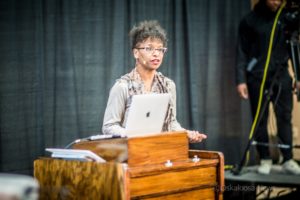Buxton: A Story Of Utopia

Rachelle Chase spoke about Buxton and her new book at a recent presentation on the campus of William Penn University.
Oskaloosa, Iowa – The story of Buxton, a community in the southwest part of Mahaska County, and the northwest corner of Monroe County has become a shining light of what racial equality could be.
That light flickered and then went out by the 1920s, as the last residents of this coal community packed up and moved to other places.
Rachelle Chase has written a new book about the community and spent last week speaking on the subject. First, she did a presentation and book signing at the Musco Technology Center on the William Penn campus, followed up a couple of days later at The Book Vault. Both events drew large crowds, and praise for Chase.
The book titled, “Creating the Black Utopia of Buxton, Iowa” dives into the subject of how a community built of blacks and whites could live in racial harmony, decades before the Civil Rights Act was in place.
Chase’s first book is a self-described pictorial history of the now-defunct town, but it didn’t leave much room to talk about the history of Buxton.
“I really was curious about the creation of the town, like the men behind it; the railroad. What were they like? Why did they do it?” says Chase, who explained she wanted to do more writing and fill in more of the details about the making of Buxton.
Exploring and understanding how the different races were able to work, live, and prosper together harmoniously over 100 years ago has been the focus of many who study Buxton. For Chase, learning about what made the community as special as it is important. “I think it’s really inspirational for people. If we could do it then, we can do it now.”
“I think there’s always been a lot of speculation about why they did it and why it worked,” added Chase. “I really think, personally, it worked because you had leaders there in town, the company. It was a company town and what they said went. From what residents have said, the Buxtons felt very strongly against, they did not condone, racial intolerance and racial violence. There was this feeling there if you couldn’t accept the way things were, if you couldn’t accept that you might be living next to a black person or a white person, or your kids would be taught by a black or white teacher; if you couldn’t accept these things, then you were encouraged to move on.”
“So I think that has a lot to do with it,” said Chase of the Buxton community. “I think also it’s because everybody was getting equal pay, and everybody was treated equal, and so everybody’s needs were met, so there’s really no need for that conflict as well.”
Buxton was the second town to work for racial equality. Muchakinock was the first community that worked towards racial equality, but it developed more thoroughly at Buxton.
Muchakinock isn’t written about and studied as extensively as Buxton has been.
“It wasn’t as big,” explains Chase. “You didn’t have the big YMCA. You didn’t have the big company store. Buxton seemed to be a bigger and better Muchakinock.”
“The McNeils did integrate the town as well, and it was similar to Buxton in that there was no segregation”, explained Chase. “It didn’t seem like it was as integrated.”
“I think Buxton took ‘Munchy’ and made a bigger and better one,” Chase added.
Chase has walked the ground that was Buxton, but she’s amazed that the town even existed there.
When Chase walked the ground, she says the feeling of history was there, “peace and history. That’s what I felt.”
You can pick up your copy of ‘Creating the Black Utopia of Buxton, Iowa at The Book Vault in Oskaloosa.










